To learn more about sponsoring a webinar, please contact Kate Fitzwilliams at 608-617-6002.
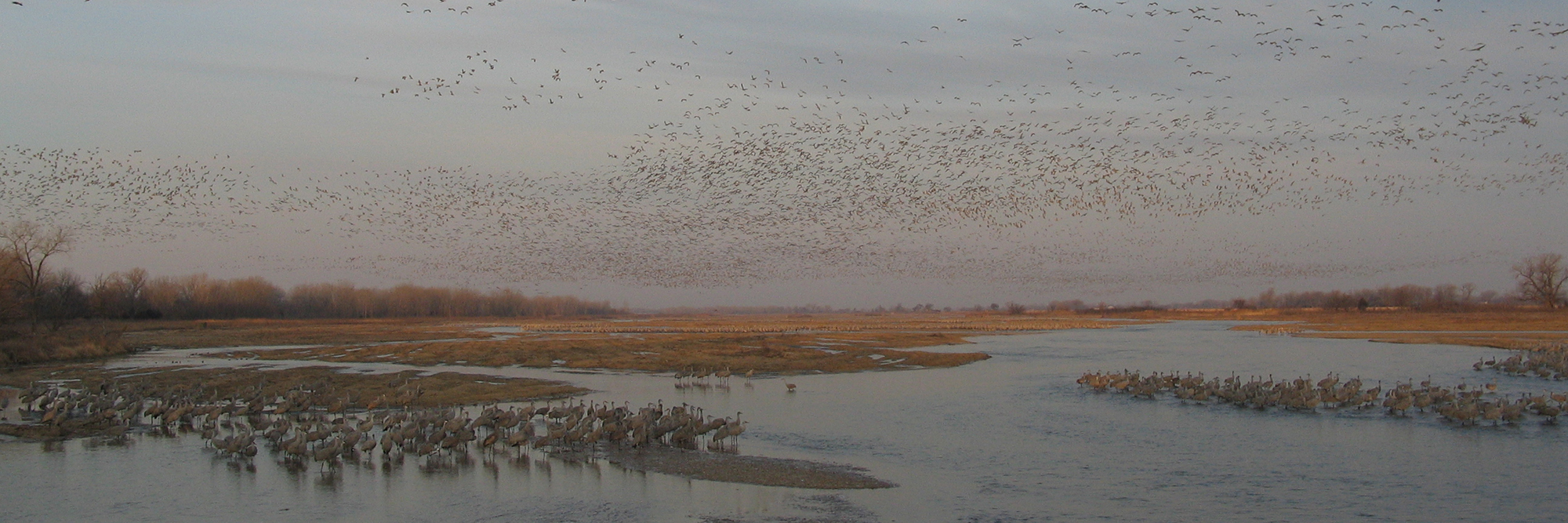

From the Field Webinars
You are invited to our monthly From the Field Webinars and new Expert Updates to learn about the International Crane Foundation’s current programs and timely issues. Click here to view the library of past webinars.
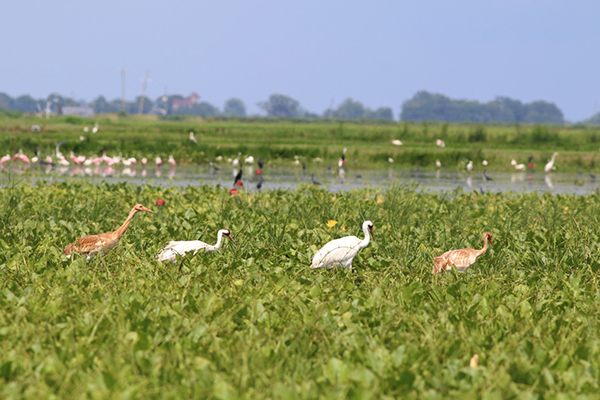
Community Connections: Supporting Louisiana’s Whooping Crane Recovery
Thursday, October 30, 3 p.m. Central Time
View the Recording
Whooping Cranes are returning to Louisiana’s coastal and agricultural wetlands, but their recovery has been slowed by human-caused mortalities such as shootings. That’s why the International Crane Foundation proactively engages hunters, educates youth, and inspires communities throughout the range of the Louisiana nonmigratory Whooping Crane population.
Since 2021, we have been partnering with conservation organizations, state agencies, and libraries to introduce the Louisiana community to Whooping Cranes. Through hunter outreach and library programs, we reach a large portion of individuals living in the core reintroduction areas, increasing awareness of Whooping Cranes in areas they frequent. In particular, our popular summer programs have reached hundreds of children each year in rural communities.
Join us as Irvin Louque and Brittney Palode discuss their outreach work, what they’ve learned, and how they’re adapting to meet ongoing challenges to build support for Louisiana’s Whooping Cranes.
Sponsored by Dallas Zoo
Photo: A Whooping Crane family in Jeff Davis Parish, Louisiana. Photo courtesy of the Louisiana Department of Wildlife and Fisheries
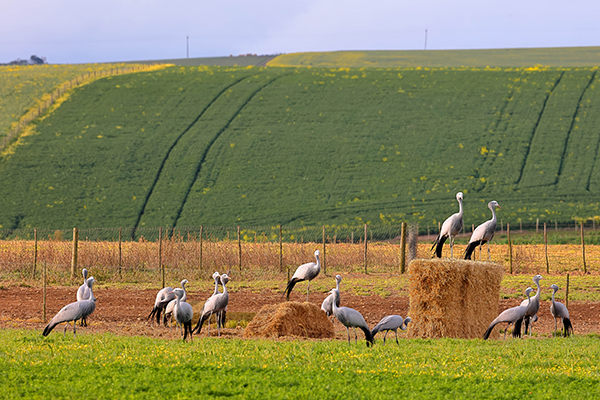
A Conservation Puzzle: Why Are Blue Cranes Declining in South Africa?
Thursday, September 18, 11 a.m. Central Time
View the Recording
Our September webinar delves into the research and monitoring undertaken by Dr. Christie Craig of the International Crane Foundation and Endangered Wildlife Trust. In South Africa, Blue Cranes rely heavily on agricultural landscapes. This raised concerns about the sustainability of the population, even though the species appeared to be doing quite well. In 2018, Christie began research on this issue, and by 2020, it became clear from data analysis that the Blue Crane population was not doing as well as previously thought. By 2024, we had some clues as to why the population was declining.
Join us on this journey of discovery, where we use research and monitoring to piece together the conservation story of Blue Cranes in South Africa. This work was supported by the Leiden Conservation Foundation, Eskom, and the Hall Johnson Fellowship.
Webinar sponsored by Tom and Kathy Leiden.
Photo: Pieter Botha/International Crane Foundation and Endangered Wildlife Trust
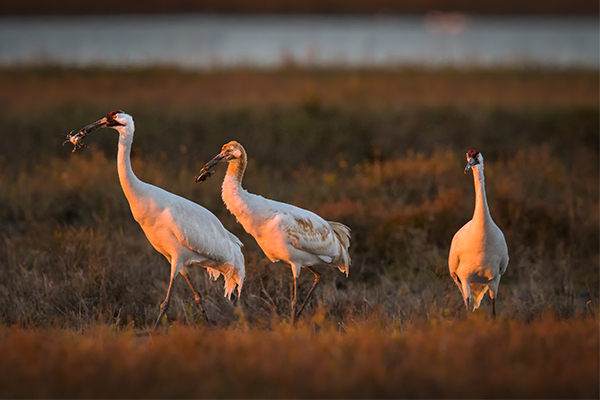
Our Next Big Step in Whooping Crane Conservation
Thursday, August 28, 3 p.m. Central Time
View the Recording
Over the past 70 years, conservationists have come to understand the habitat needs of the last self-sustaining population of Whooping Cranes, the Aransas-Wood Buffalo Population. These rare and endangered birds rely heavily on estuarine habitats of the Texas Mid-coast, where they eat blue crabs, Carolina wolfberries, mollusks, and other food items during the winter.
However, Whooping Cranes continue to surprise us, and they are increasingly using habitat away from the coast. At first there were just a few individuals, but the number of Whooping Cranes wintering inland continues to increase.
Join us on Thursday, August 28 at 3 p.m. CT, where our Director of Gulf Coast Programs, Dr. Carter Crouch, will discuss what we are learning about these inland wintering birds, how we are helping them, and the implications for how we manage, monitor, and plan for this population’s continued recovery.
Webinar participants will also be among the first to hear about a bold new strategy our Texas Program is pursuing, one that will increase our commitment and impact for Whooping Cranes. We’re excited to share this plan with you!
Thank you to our August webinar sponsor: Steve Gast, ICF Board Director and Texas Crane Council Chair.
Photo by Ciming Mei
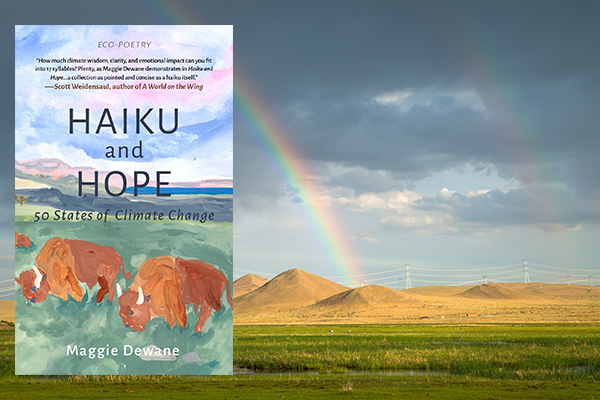
Learn the Art of Haiku and Hope with Author Maggie Dewane
Thursday, July 31, 3 p.m. Central Time
View the Recording
Join author Maggie Dewane and the International Crane Foundation to explore the art of haiku and learn how to write your own! In this virtual workshop, participants will be guided through a nature journaling exercise that tugs at imagination and invites creativity. Building upon individual sensory observations and experience, participants will be encouraged to consider elements of nature in new ways, as well as how everyone can take flight in poetic expression. By the end of the workshop, participants will have crafted their own haiku.
Maggie Dewane is an author and filmmaker who has traveled to all seven continents to understand climate change, conservation, and how both impact people. Through short films, news articles, and poetry, she translates climate science for lay audiences to empower them to take action.
Maggie’s new book, Haiku and Hope: 50 States of Climate Change, offers a unique exploration of the United States through the evocative lens of haiku. Dewane takes readers along on her journey to visit all 50 states, as she both experiences the landscape in its current state through an initial poem and then imagines its future in a second haiku. After the collection of haiku, a narrative section delves into Dewane’s personal journey, sharing the experiences and moments of inspiration that led her to write each poem. This reflective portion of the book provides readers with a deeper insight into her travels and the emotional impact of witnessing the changing environment firsthand. This collection is a celebration of America’s natural wonders, a call to action in the face of climate change, and a testament to the power of poetry to move us.
Sponsored by Jeanne and Ed Eloranta.
Photo by Ciming Mei
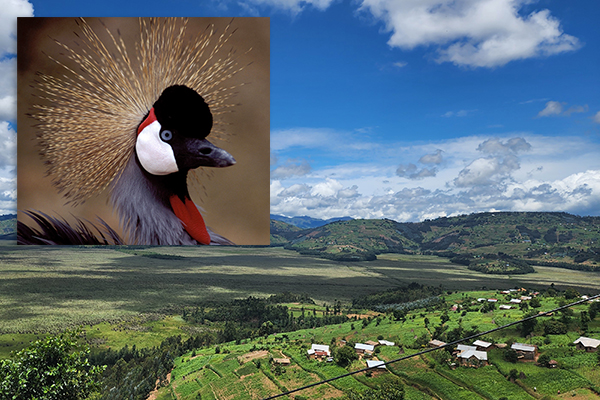
Guardians of the Wetlands—12 Years of Crane Conservation and Community Resilience in Rwanda
Thursday, June 19, 11 a.m. Central Time
View the Recording
Over the past 12 years, the International Crane Foundation has worked in Rwanda to protect the Endangered Grey Crowned Crane, restore critical wetland ecosystems, and empower local communities. This webinar will highlight the Foundation’s integrated approach to conservation—combining crane safeguarding and monitoring, sustainable wetland management, and community-led resilience initiatives. Join us to explore how this holistic model is not only safeguarding Rwanda’s biodiversity but also improving livelihoods and inspiring a new generation of conservation stewards.
Sponsored by:

Photos: Aerial view of Rugezi Marsh and surrounding communities by Charles Kayijamahe/International Crane Foundation; Grey Crowned Crane by Mike Endres
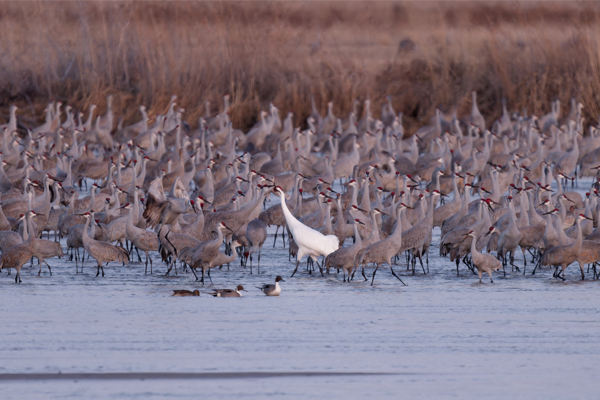
Endangered Species Act: A keystone of conservation success under threat, and what you can do to help
Wednesday, May 7, 3 p.m. Central Time
View the Recording
The Administration proposed an administrative rule change that would profoundly weaken the Endangered Species Act (ESA), the most important law for protecting and conserving threatened plants and animals in our country. Signed into law in 1973—the same year as the International Crane Foundation was established—the ESA is a keystone of conservation success. It is credited with saving 99 percent of the species it protects, like the Endangered Whooping Crane, which was part of the first cohort of species protected by the law. We believe this change would be catastrophic for endangered Whooping Cranes, countless other species, and their habitats. Join International Crane Foundation staff in a webinar on Wednesday, May 7, to learn more about the proposed rule change and what you can do to help protect this vital conservation tool.
Sponsored by Heidi Kiesler.
Photo by Dr. Tran Triet/International Crane Foundation